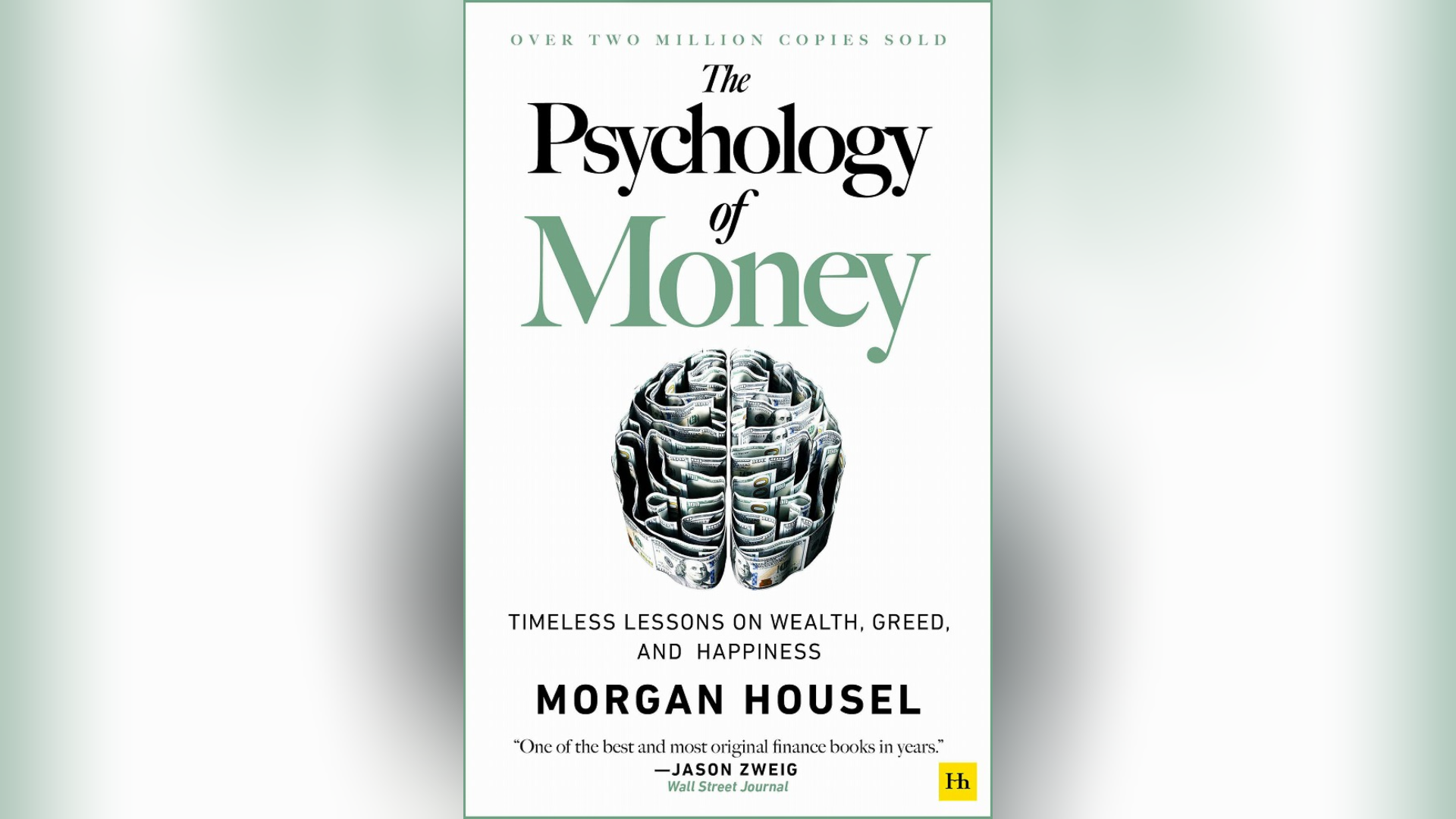The Psychology of Money by Morgan Housel

In this blog, I'll share some thoughts and learning points from each chapter of 'The Psychology of Money.' As I finish listening to the book, I've connected the points to my own learning experiences, and I encourage you to do the same. :>
No One's Crazy
1st Learning Point
When it comes to financial decisions, it's important not to jump to conclusions based on our own experiences. I always remember the story of former US President John F. Kennedy, who, despite the hardships of The Great Depression, had no bad memories from that time. Ironically, he went on to lead the country, preventing a second Great Depression.
Winning the lottery is a rare success, a one-in-a-million chance. You might wonder why those struggling financially, unable to spare $400, would spend the same amount on a lottery ticket each year. Well, for them, it's a dream – a chance to break free from the shackles of poverty.
So, the next time I find myself judging someone's financial choices, I'll pause and remind myself to think. While I may not fully empathize, I can strive to accept and understand the underlying motivations behind seemingly illogical decisions.
Luck and Risk
2nd Learning Point
The infamous story of Bill Gates having a one in a millionth chance of having access to a computer during his high school years is his key to success; but why few people recited that Gates's friend, Kent Evans who also died in a mountaineering experience in his high school years, which only had a one in a millionth risk of occurence. Yet, both events happened.
Luck and risk are siblings that we do not have a gauge of which is happening, and we can't avoid risk and seek luck in our control. This acknowledgement acts as a reminder to not focus on the stories of extremely successful people, and focus more on how to control what I can control, like my time and effort; and not to judge others failures as an act of laziness but conclude my failures as unlucky incident.
Never Enough
3rd Learning Point
The stories of Raja Gupta and Bernie Madoff serve as a wake-up call for future me. They remind me to be content with the wealth I have, recognizing that having enough is crucial to avoid risking the loss of something truly valuable in pursuit of unnecessary excess. What matters most to me are things like health, love, family, personal freedom, and having sufficient wealth to secure my financial future without constant worry.
Beyond a certain point, more money and power won't necessarily increase my happiness. It's about recognizing when I've crossed that threshold and embracing the satisfaction that comes with having enough. Until then, I'm definitely on the journey toward that goal.
Confounding Compounding
4th Learning Point
The occurrence of five Ice Age cycles, attributed to the accumulation of thin layers of snow that persistently resisted melting during cooler summers, underscores the profound influence of time in this natural process. This principle – that tremendous results don't always require tremendous force – finds resonance in Warren Buffet's remarkable fortune. Buffet embarked on his investment journey at the age of 10, and over 75 years, this consistent effort yielded a wealth of $89 billion. While he may not be the epitome of investors, Buffet's success lies in the compounding effect of time.
This serves as a valuable lesson for me. Although I may have missed out on the 10 early years of investing that Buffet had, I have many years ahead. Initiating my investment journey now and committing to it without giving up halfway, I believe I too can amass the wealth I desire. The key is simple – never stop.
Getting Wealthy vs Staying Wealthy
5th Learning Point
Becoming rich might seem like a straightforward goal, but the real challenge lies in maintaining that wealth. To stay affluent, it takes a blend of "frugality and paranoia." Constantly staying vigilant about the uncertainties of tomorrow enhances our chances of sustaining success.
In the realm of the stock market, longevity is the key. It involves resisting the urge to sell in a panic, keeping some cash reserved for unforeseen emergencies even in bullish markets, and not succumbing to the rush to accumulate stocks during periods of significant returns. While planning wisely is crucial, it's equally important to acknowledge that reality may throw curveballs at our plans. Optimism for the future should be paired with a healthy dose of paranoia about the journey to get there.
Tails You Win
6th Learning Point
This chapter hones in on the significance of diversifying your investment portfolio. The tales of Heinz Berggruen, Venture Capital, Russell 3000, and Warren Buffett underscore that the most substantial returns often come from navigating extreme odds. Successful companies frequently attribute over 50% of their profits to one or two key products.
How can we apply this strategy on an individual level? The key lies in maintaining consistency when everyone else seems to be losing their heads. Adopting the approach of regularly investing in the stock market, irrespective of favorable or adverse news, leads to a much more robust portfolio compared to those who bail out during a recession. In the volatile realm of stocks and business, setbacks may occur due to financial disasters, but by relying on favorable odds, we can ultimately secure success.
Freedom
7th Learning Point
'People want to control their lives. The ability to do what you want, when you want, with who you want, for as long as you want, is priceless.'
It has been asserted that happiness stems from having the freedom to engage in the aforementioned activities, rather than being tied to salary and prestige. The power of money to provide greater control over one's life is what makes it so highly sought after. The author's personal journey, interning as an investment banker, serves as proof that despite the dream job status due to its pay, the long working hours made the work unenjoyable.
In this current era, where mental prowess often takes precedence over physical labor, work doesn't neatly conclude when we clock out of the office. The ability to work just as efficiently at 2 am as at 10 am in the office has led to the unsettling feeling of losing both freedom and time. Survey results, indicating that the majority values quality friendships, involvement in something of greater value, and spending meaningful time, whether structured or with children, over working excessively or earning more than others, underscore the idea that controlling your time is the highest dividend money can pay.
Man In The Car Paradox
8th Learning Point
People often seek wealth to signal to others that they should be liked and admired. However, in reality, most individuals don't really care about the person who owns the wealth; they're more interested in wealth as a status symbol. Respect and admiration are genuine desires, but flashy watches and expensive cars might not be the most effective ways to earn them, despite what you might think. Instead, prioritize qualities like humility, kindness, and empathy – they tend to garner more respect than luxury items.
Wealth Is What You Don't See
9th Learning Point
The irony of wealth often hiding in plain sight teaches us a crucial lesson in being frugal to maintain wealth, as opposed to merely appearing rich. In accounting terms, owning a car may pose as a liability due to the accumulated depreciation over time or, in the worst-case scenario, an undisclosed bank loan backing it. However, society tends to label those driving a Ferrari as wealthy, which is a misconception.
Another vital lesson is to spend within your means and avoid spending money you don't have. To preserve wealth, exercising self-control in managing assets is key, rather than splurging on expensive possessions.
Save Money
10th Learning Point
Saving is a realm of financial control that's within our grasp, much more so than the unpredictable terrain of earning more money. It doesn't hinge on luck or elaborate strategies. Opting for a wealth-building strategy that emphasizes a robust income, rather than relying on optimism amid a lackluster stock market, can be a boon to our mental outlook on wealth accumulation. Once our basic needs are met, the pursuit of materialism beyond that becomes optional. By curbing our spending and desires, we can employ savings "as a hedge against life's inevitable ability to surprise the hell out of us at the worst possible moment."
Savings offer flexibility and liberation from constant worry. While the returns may not match the 10% per annum allure of stocks, savings provide a buffer during market downturns. The flexibility that savings afford us enables patience for opportune moments in both our careers and investments. It allows the luxury of pursuing our passions, embracing a slower pace, and contemplating life with a different set of assumptions—setting us apart in ways that might be more pivotal than intelligence.
On a personal note, saving money comes naturally to me, shaped by growing up in a frugal Asian household. As I've matured, my interest in stock investing and alternative wealth-building methods has grown. This chapter serves as a reminder to maintain frugality and guides me in allocating funds to both savings and investments.
Reasonable Is Greater Than Rational
11th Learning Point
Reasonable is more realistic than rational, and it's more sustainable in the long time financial journey. The example of fever phobia, even though it was proven scientifically to significantly slow down viruses' growth, shows that humans tend to be reasonable in fighting off fever that brings pain, instead of thinking rationally as a mechanism for faster recovery. People do not want the mathematically proven strategy, but the strategy to sleep soundly at night; hence, rational decisions in the stock market are rarely seen. And this is fine.
The psychological impact of losing wealth after using a rational decision will severely deter the usage of that strategy, even though it is statistically proven to be more profitable. By being passionate, confident, and motivated in the stocks invested, people are more likely to move on with the failures and continue their planned strategy, instead of shifting to other ways, as the stocks selected through rational decisions are not as appealing to them.
Surprise!
12th Learning Point
'Things that have never happened before happen all the time.'
We tend to study history as if the past is an accurate map of the future financial direction, but it's not. Relying on past data to form models on how the market will perform is unwise, as it's not science; it is constructed by a massive amount of people making reasonable decisions to themselves. Things change over time, hence surprises do happen. By being complacent with following history, we will fall greatly when the big outlier event occurs, e.g. The Great Depression, WWII, Dot Com bubble, housing crash during mid-2000s. And it's the same as the stock market; we can't predict future investment returns using past data. The failure of imagination and the difficulty in anticipating a major event will inevitably cause people to be unprepared for both good and bad events. Major structural changes in society also made historical data inaccurate to predict the future.
As we know that surprises can happen all the time in the stock market, we need to be prepared mentally and continuously review our strategies in investing for improvement.
Room For Error
13th Learning Point
When playing the game of odds, we require humility to stay in the game; hence, a room of error ensures that we can win the odds when it comes. By planning on your plan not going according to plan, you can be comfortable with uncertainty and randomness. In the stock market, by having a margin of safety, we can afford to render the forecast unnecessary. As mentioned in the previous point that surprise can happen in the stock market, we need to be able to accept a range of activities that can occur to stay in the game, and this is not a default thing to do and is often underappreciated. We need to train ourselves, on an individual level, to have a room of error in everything we do, and not as an equivalent term of 'being too conservative.'
Remember: 'Room of error lets you endure a range of potential outcomes, and endurance lets you stick around long enough to let the odds of benefiting from a low probability outcome fall in your favor.' To have an edge to stay in the game aligns well with our 4th learning point to compound the profit over the long term.
To apply this in reality, we need to invest with the mindset of 'I would assume that the return of my stocks earned in my lifetime will be 1/3 lower than the historical average.' And by aiming for a low expectation, we can avoid optimism bias and always consider the risk incurred in an action to determine whether it is worth taking the risk, just like the classic Russian Roulette game and taking leverage when it comes to investing. Just, don't.
You'll Change
14th Learning Point
We, humans, are poor forecasters of what we want in the long term. We will regret the decisions we made during college, but due to sunk cost fallacy, we can stay in the career even though we don't want to do it anymore. We are not always thrilled with the long-term goals that we have achieved. And the fact that humans change easily over the course of a long period and don't want to do the same thing for so long affects the probability of one succeeding in investing in stocks, which takes a certainly long period of time to compound. There's no easy solution to this problem, but there's one thing to keep in mind: you should avoid the extreme end of financial planning to have 100% of everything.
Sometimes future regret is unavoidable, and we should quickly accept the reality and move on when change is possible. And remind ourselves that 'I have no sunk cost' can be a good strategy to get back to compounding as quickly as possible.
Nothing's Free
15th Learning Point
Nothing comes for free, especially in the stock market. One key point to consider is that changing the mindset of viewing plunging stock market prices as a fee rather than a fine can drastically alter our perspective and provide psychological relief.
'Holding stocks for the long run!' is easier said than done, much like admiring a CEO's high salary without understanding the stress and responsibilities behind the scenes. People often seek ways to get something out of nothing in the stock market, akin to shoplifting a car. The tactical fund strategy proposed by Morningstar to switch between stocks and bonds at opportune times did not fare better than simply holding stocks through the fall.
Sometimes, predictability can be deceiving, especially on the balance sheet. Companies like General Electric, under the leadership of Jack Welch, offered predictability and consistency, creating the illusion of not needing to pay the price. This boosted investor confidence and stock demand. However, the illusion shattered one day with the loss of billions of dollars, masking inadequacies in revenue numbers. The moral of this story is not to blindly trust predictability in financial reports.
Lastly, treating market volatility as a fee for greater returns than cash and bonds, instead of a fine, will greatly enhance your investing experience. Embrace the magic.
You And Me
16th Learning Point
Why can't we seem to learn our lessons when it comes to financial bubbles?
'People are greedy,' one might say, but that's not the entire explanation. Individuals with different goals find themselves invited to play in the same arena. For instance, long-term investors take cues from day traders who are simply out to squeeze every cent of profit from a stock, boosting short-term returns. This leads to a phenomenon where, when financial bubbles burst, it's usually the long-term investors who suffer as momentum is lost. When rational day traders and confused long-term investors compete in the arena of growing financial bubbles, you can guess who'll lose. Hence, the moral of the story is to know the game you are playing and not be swayed by the actions of those playing a different game. For me, I aim to be both a short and long-term trader, earning the ability to differentiate my goals effectively.
The Seduction Of Pessimism
17th Learning Point
Pessimism is more common, and it often seems more sophisticated than optimism. This was clearly illustrated during the 2008 global financial crisis when the front page of the Wall Street Journal featured the extremely pessimistic forecast of Professor Igor Panarin, a Russian professor and political scientist, predicting the disintegration of the US Nation. However, this forecast did not materialize. Similarly, after WWII, those who were optimistic about Japan's future would have been considered crazy, but one generation later, their optimism proved true.
People tend to pay more attention to pessimistic ideas and often dismiss optimistic ones. This behavior stems from our desire to understand pessimistic ideas so that we don't dismiss them outright. We recognize that losses have a greater impact than gains.
Financial disasters are often on a larger scale and impact more people compared to natural disasters. This creates fertile ground for pessimism to thrive during financial disasters, as people tend to extrapolate the current trend without considering how the market adapts. The rapid evolution of extraction technology to meet the market demand for oil is a prime example, contradicting expert predictions that we would run out of oil.
The moral of the story is that, while pessimism may sound more reasonable than optimism, we should not succumb to such thoughts. Instead, we should recognize that the odds can still favor us, even in the face of setbacks. This, my friends, is optimism.
When You'll Believe Anything
18th Learning Point
The tale of aliens visiting Earth, befuddled by the financial market's downturn between 2008 and 2009 despite a seemingly consistent environment and advancements in technology and healthcare, illustrates how humans, when skeptical about optimistic narratives regarding financial market stability and prudence, can inadvertently contribute to market contraction.
Stories wield immense influence in the economy, capable of either breaking or bolstering the market. When there are aspects of life we fervently wish to be true, we become susceptible to believing any compelling narrative, even if it's merely an attractive fiction. This phenomenon is particularly prevalent in the financial market; it occurs when individuals are eager to maximize their gains, reluctant to entertain painful scenarios, seeking favorable odds, and lacking a comprehensive understanding of reality, leading to self-created explanations that align with personal beliefs but don't accurately depict reality.
'The illusion of control is more persuasive than the reality of uncertainty, so we cling to stories about outcomes being in our control.' It's essential to recognize that money doesn't operate like science. Just as we can't predict our financial future with 99.99998% accuracy, akin to NASA's precise timing for launching a spaceship to Pluto, despite our desperate desire for such certainty.
All Together Now
19th Learning Point
The historical lack of communication between doctors and patients in past medical practices led to tragic incidents. However, there has been a shift from merely treating diseases to treating patients as a whole. Nowadays, patients have a plethora of options for self-treatment, mirroring the situation in the financial world. Financial advisors possess knowledge about correct strategies and plans, but the ultimate decision rests with individuals to choose the plan that suits them best.
By amalgamating the points from the 1st to the 18th, you can evolve into a much better investor. Embrace success, learn from failures, rise, and move forward. Lastly, focus on controlling time rather than relying on luck and managing risk. This approach can lead to a happier life, allowing you to sleep soundly at night even in the face of a highly volatile market
Confessions
20th Learning Point
Professionals often don't choose their own ways when doing things; for example, it was observed that doctors don't invest their lives in the treatments they administer for their patients, and fund managers typically don't put their money into their own funds.
For the author, what works for him is how his family thinks about savings. He aspires to financial independence, where he can wake up every day and do what he wants, and change his trajectory if he desires. By maintaining a high savings rate and making reasonable financial decisions within the family, the author has successfully preserved his lifestyle and gained financial freedom. He believes in investing in low-cost index funds, and he can achieve financial freedom by consistently dollar-cost averaging. He doesn't need to beat the market to succeed, which may differ from other people.
He admits that he may change, just like everyone else, but keeps one thing in mind: No one's crazy.

Stay tuned for more books review
Look forward to reading more books this year

